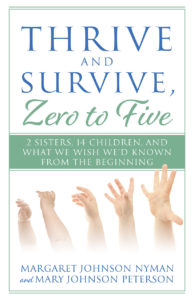Excerpt from THRIVE AND SURVIVE, ZERO TO FIVE
Most young children are reluctant to end the day when it’s time to head for bed. Not only does it initiate isolation from other family members, it signifies putting toys away and ending playtime. That’s why children work to keep mommy in the room as long as possible. Unbeknownst to them, however, this strategy on their part becomes a powerful perk for mothers who want to take advantage of this tender time.
Your youngsters become especially warm to what you do during these moments, hanging on your every word. It becomes an optimal time to memorize a short line of Scripture or sing a song. I (Margaret) sang bedtime choruses to Nelson, our firstborn, starting when he was about a year old. As he learned to talk, he picked up the words, and by the time he was three, he had memorized (and could sing) fifty-five Sunday school songs.
These short choruses were full of God’s truth, simplified for children, and as the two of us continued singing, Nelson often asked questions about the words, attentive to my answers. Be sure to include a prayer of blessing over your child before you leave the room. God is there listening to you and loves to answer a mother’s heartfelt prayers.
These bedtime suggestions might sound elaborate and time consuming, but the whole thing can be done in just a few minutes. Think of it as the most valuable part of your routine, even more important than having a bath or brushing teeth.
As you step out of the room, along with your “night-night, honey,” conclude this time with something uplifting. “I love you very much, darling,” or “See you in the morning!” Staying positive is better than, “I hope you’ll do better tomorrow.” Try to express unconditional love . . . one more time.
 SIDEBAR: POTENTIAL FOR EVERY DAY
SIDEBAR: POTENTIAL FOR EVERY DAY
- Hug your child.
- Say I love you.
- Praise your child.
- Compliment your child for any job done.
- Kiss your child.
- Tell him you’re glad he’s yours.
